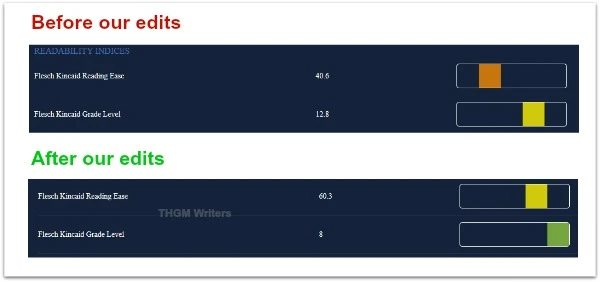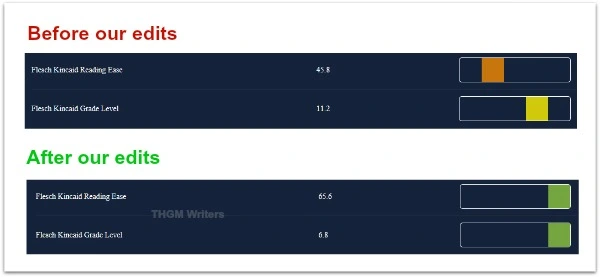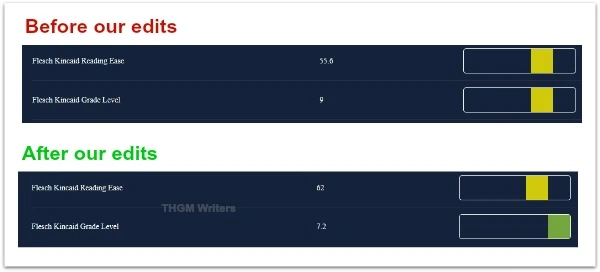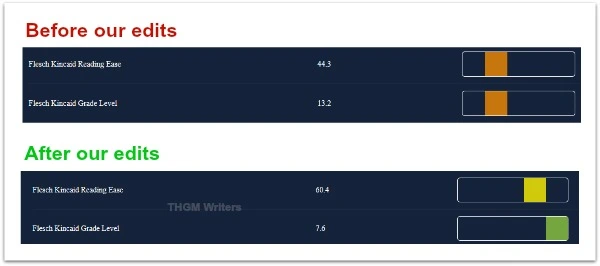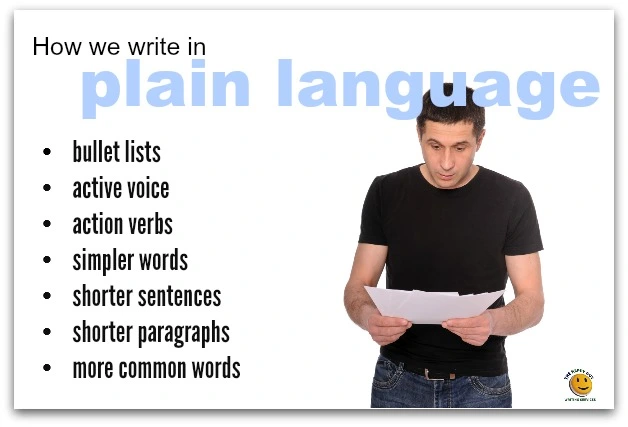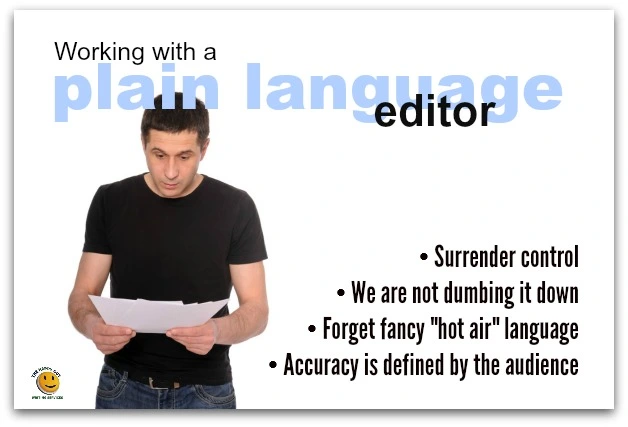If you want people to understand your message, it has to be written in “plain language”. That means clear, concise writing. We can help you with a plain language edit or rewrite of your website, reports and other documents.
A plain English edit gives you two big wins:
- More people will understand what you say.
- More people will keep reading, because it’s less work for them to do so.
Get through to your audience
Hire a plain language editor to help you communicate 10 times more effectively.
We can help. We understand the principles of plain language writing. And we do it well.
Here are our three top plain language priorities:
- Clarity. We want your information to be well-understood by your target audience and by any others who might read your message.
- Ease of reading. We want people to find it easy to read your message, so that all readers keep reading – not just the most motivated and most educated.
- Scanning. We want people to subconsciously decide to move from scanning your message to reading your message.
Fill in the form on this page to get a quote on editing or writing your documents or website for plain language and readability.
What is “readability”? It is a metric or measurement we watch. A readability score is just a calculation; plain language is much more than a calculation. But this gives you some idea of what we can do.
Here are four examples of readability statistics. Each one shows the text before and after editing for plain language, readability and scanability:
Example #1: readability scores before and after our plain language edits
Example #2: readability scores before and after our plain language edits
Example #3: readability scores before and after our plain language edits
Example #4: readability scores before and after our plain language edits
Praise for our plain language editors and writers
Our client are pleased with our plain language editing and writing services. Here are some of the things they have to say. (Read more testimonials here.)
Whitney Henry (plain language edit of corporate brochure)
Hi David, after you worked your magic, the book got approved without issue! It is being printed now. Thanks so much for your assistance. I will keep your contact info in case we have something else that we need your help on!
Dan Hughes, safety expert
David I really like this and my writing style was not lost with your editing and assistance. It still reads like I wrote the story.
Vassili – marketing manager
I REALLY like how you write!!!
The articles are so easy and interesting to read. Thank you very much!
![]()
Why you need to hire a plain language specialist
The harder your document is to read, the less effective it will be. Here are four reasons to write all your communications in plain English.
- get more readers
- keep more readers
- reach more readers
- please more readers
Tap or click to read more on the four reasons you need plain language writing.
You need plain language to grab reader attention.
Your readers will do two things when they arrive on your page.
- They will consciously decide if the web page or document is right for them.
- They will subconsciously calculate the ROI (return on investment) of reading your text.
The page is right for them if it reflects what they expect when they get there. Your titles and sub-titles should say what the reader expects. Talk the reader’s language.
HINT: Use the same words people use to find your page in search engines.
Cute headlines are…cute. But clever puns don’t communicate. By the time readers would realize how clever you are, you’ve already lost them. We create headlines and titles that tell people exactly what to expect. That’s the value of plain language writing.
Meanwhile, readers are deciding whether it’s worth investing their time in your message. They do a subconscious ROI calculation. ROI is pretty simple to calculate. Ask yourself this: “Will I get enough out of this to be worth the effort reading it?”
To answer that question, people ask themselves two obvious questions:
- How much will I get out of reading this?
- How much effort will it take to read this?
The easier the page looks to read, the more people will read it. Pretty simple.
Some people might read on, even if it looks like a lot of work. For instance, if they are highly motivated, having no doubt that your message will change their life forever, they will read on. Or if they believe that they have to read it in order to complete a regulatory requirement, they will also read on.
But most people are not highly motivated. And rarely will they feel obliged to read your message. Remember all those “terms of reference” you read before signing up for things on the Internet? Neither do we.
If your text looks challenging, you will lose most readers. Here’s how we make your text more inviting to keep most of your readers:
- We insert images when appropriate
- We create bullet lists that feel easier to read.
- We call out long quotes so that they feel lighter to read.
- We break up large blocks of text that intimidate readers.
- We use short, simple words that feel like a smooth path to readers.
- We add headings and subheadings to break up the text and help readers find what they seek.
You need plain language to hold reader attention.
If your target is the general population, people who are not specialists, we recommend writing for grade eight students. Or even for lower grades. The Government of Canada wants text written in the zone for grade six to grade eight.
You might wonder why we set such a low target. The answer is simple: human nature.
Doctors, scientists and lawyers all have somewhere around 20 years of schooling. So they would be capable of reading up to a grade 20 level. Capable, yes…but will they? That depends on a number of factors:
- Are they tired?
- Are they in a hurry?
- Do they have to read it?
- Are they excited to read it?
- Could they do something else with their time that is more enjoyable or more profitable?
The bottom line is this: the easier it is to read, the more people will read it.
With plain language, those who read your text will read more of it. They will keep reading further on than if it is harder to read.
And most readers will feel they have gotten more out of reading it, because they understand it better.
You need plain language to reach your readers.
The funny thing about people, even very smart people, is that they don’t always write the way they talk. People often use big words and convoluted sentences when they write. That make it hard for readers.
Some of your readers are familiar with your topic. Some are less familiar. Some might know nothing or almost nothing about it. Unless you are writing in code, you probably want all of those people to understand what you have to say. That means you need to use language that even the newcomer understands.
Here is a good question to ask yourself. How hard will it be for these five people to understand my message:
- the hair stylists at the salon
- the young people who bag my groceries
- the old immigrant lady who lives two doors down
- the folks who keep the food court clean at the mall
- the plumber or carpenter who worked on my house last year
Not everything can be made that easy to read. An explanation of the difference between fusion and fission will always be a tough read. People with minimal education or a poor grasp of English might not be able to read about it. But the plainer the language you use, the more people will understand. And the better they will understand.
Keep in mind that even people with a high education will have to work to read about an unfamiliar topic. A doctorate in business systems won’t give them 20 years of education in geology. The more work you make them do, the less they will read. And if they do read, and might be tired or distracted, they will understand less.
You need a plain language rewrite to improve customer satisfaction.
Numerous studies show how customer satisfaction improves when documents are written in plain language. Why?
- People work less to read the materials.
- People understand more of what they read.
- People are less frustrated and more satisfied.
And that pretty much sums up the concept of “customer satisfaction”. So, here is the math:
Plain language = customer satisfaction
Check your readability statistics here. If they come in above grade eight for a general audience, you should hire a readability expert to edit your materials.
How to find a plain language writer for hire
We can help. We understand plain language and how to communicate clearly and effectively. For a free quote on hiring a readability expert or plain language specialist, tap or click the red button to the right.
How we write your materials in plain language
Anybody can paint. Anybody can sing. Anybody can write. But if you want a painting people will value, a song people will enjoy or a text that people will understand, hire a professional.
Tap or click to learn about our top 7 plain language editing and writing strategies.
Plain language strategy #1: We make shorter paragraphs
The bigger the block of text, the harder it is to read. Any paragraph that can be broken up into shorter paragraphs (or into other elements) makes your message more effective.
You can see how shorter paragraphs improve your readability score.
Plain language strategy #2: We make shorter sentences
The longer the sentence, the harder it is to read. We try to keep sentences below 20 words. When possible, under 10 words is ideal.
This often means splitting sentences that have two ideas. Sometimes it means creating a bullet list out of part of the sentence. If one concept affects two things, we might make a two-bullet list. And we throw away useless words that make your sentences longer without adding any value.
You can see how shorter sentences improve your readability level.
Plain language strategy #3: We use simpler words
Simple words are not just for simpletons. Even horticulturalists and astronomers read better when you use words like “try”, “see” and “use”. In fact, when a sentence already has a couple large terms, such as “embedded systems programming” or “premature ventricular contraction”, it is even more important that the words in between be simple.
You can see how shorter words improve your readability score.
Plain language strategy #4: We use more common words
As important as simple words are, it is even more important to use common words. A common word is a word almost everybody understands.
For instance, “meat” is simpler than “substance”. But some readers might not understand “the meat of the problem”. Don’t forget, your audience might include:
- seniors
- teenagers
- immigrants
- foreigners
- people with very little education
You cannot see the effect of more common words in your readability score. Sorry. Readability is just an algorithm, and some things don’t calculate easily.
Plain language strategy #5: We use bullet lists
A sentence that lists three items or more is usually long and complex. If the three things are earth, wind and fire, it’s not too bad. But in most cases, bullet lists make it easier for people to mentally separate the items. And in most cases, bullet lists make your text less work to read by:
- shortening sentences
- shortening paragraphs
- making a list look like a list
- visually breaking up the text
You can’t see this in your readability level, except that it will make shorter sentences.
Plain language strategy #6: We write in the active voice
Pop quiz time. Which of the following is the better way to write the sentence?
- I ate the salad.
- The salad was eaten by me.
The first is an example of the active voice. The second is the passive voice. People think in the active voice, at least in English. They find it easier to read in the active voice. A smart person would obviously choose the active voice, right?
Guess who writes the most in the passive voice?
- financial experts
- great legal minds
- scientists of all kinds
- professors and academics
- epidemiologists and other medical specialists
That’s OK. They have their specialties. We have ours. Our specialty is getting your message across clearly and effectively. We almost always write in the active voice.
You cannot see this reflected in your readability score.
Plain language strategy #7: We use action verbs
Did you know that nobody ever had to “tender their resignation” or “send an invitation to people”. Never. But some people do. Tsk, tsk. So many wasted words and useless letters, when they could just “resign” or “invite people”.
Other plain English writing strategies
The seven strategies above are not all we do. We also:
- re-order information for clarity
- explain acronyms and special terms
- compare the audience to the words used
- write in positive terms, rather than negative
- speak to the reader instead of about the reader
In fact, we use many strategies to make your message reach your audience better. And you won’t see all of them reflected in your readability score. But a plain language edit will boost your readability level, as well as its clarity and effectiveness.
How to find a plain language editor for hire
We can rewrite your documents or website in plain language that your audience will understand. For a free quote on plain language editing or writing, tap or click the red button to the right.
How to work with a plain language editor
Some people find it very easy to work with a plain language writer or editor. Some people find it very tough. Here are a few tips to make it easier for you
Tap or click to read more on how to work with a plain language writer.
You have to surrender control of the words.
You are the expert in Forex or liver transplants or living wills. Whatever you do, you are the expert in your field.
We are the experts in writing.
So, here’s the deal. We’ll let you decide how to leverage currencies or cut out the organ or add a clause to a will. You let us decide how to word your information for maximum readability and clarity.
There will be times when we get it wrong. There will be times when we don’t know terminology that has to be worded a certain way for legal reasons. Or there might be concerns about technical accuracy. We do need to know. So you can’t be 100 percent hands off.
If you focus on accuracy of the information, and let us focus on wording, we can create the ideal message together.
Plain language does not mean dumbing it down.
We don’t dumb down your documents. Readability does not mean stupidity. We use language people can understand better. For example, in one edit, we changed some words for simpler ones:
- “purchased” became “bought”
- “deliberate” became “debate”
- “was established” became “began”
- “in the aftermath of” became “after”
None of these were really hard words to begin with. But the new words are more common and simpler to read. Most importantly, we made these changes without changing the meaning at all. We didn’t dumb down the text. We simply made it clearer. We actually smartened up the text.
What was notable about this project is that the page was full of big words that we could not simplify. There were:
- official processes
- fancy professional titles
- long names of organizations
These were long and complex words. The sentences were a huge challenge to plod through, even for experts. By simplifying those words that we could, we made the sentences simpler. That made it easier for readers to tackle the more complex words that we could not change.
Plain language does mean leaving behind the “hot air”.
There is a theory that politicians come from another planet. Have you noticed that politicians never speak to people? They speak to Americans. Or to Canadians. Or to Australians. But not to people. And they never travel across the country. They always travel across the great country.
Humans would say: “I have spoken with people across the country.” They know that we know our country is great. They know who lives there. Sure, it’s a great country, but we don’t go around adding “great” to the front of everything we like.
Politicians say: “I have travelled across this great country, speaking with Americans (or Canadians, or Australians, etc.)
If you don’t want to be seen as an alien or a politician, let us remove the “hot air” words for you. Straight talk is plain language.
Accuracy is defined by the audience.
If you are writing for academics or scientists, you will have to be completely accurate. Two similar wordings might mean very different things. There is a difference between a diagnosis and a probable diagnosis. There are different levels of probability. The word “significant” might have a very specific numerical meaning in one context, and a different specific numerical meaning in another context.
But if you are writing for the general public, all that accuracy will make the message more confusing. In some cases, dumbing it down is actually a smart approach. If we are writing for the general public, let us use plain English that will create understanding rather than confusion.
How to find a plain language specialist for hire
We can write your documents or website in plain language for increased readability. For a free quote on hiring a readability specialist or plain language expert, tap or click the red button to the right.
The best plain language specialists and readability experts
Our professional plain language writers are for hire. They are eager to help you reach your customers, your partners and your audience. They will write, edit or re-write.
SIX QUESTIONS THIS PAGE IS MEANT TO ANSWER
- What is plain language? (ANSWER: Plain language is about making it easy for readers to understand what you want to tell them.)
- I already have a text. What next? (ANSWER: That’s a great start. Most of the information is already there. We just need to edit it or re-write it using plain language principles.)
- I want writing in plain language. I have a lot of big words, but they are important. Can I keep them? (ANSWER: Absolutely. Official names of committees or processes or other technical terms should be kept, if the audience needs them. But we’ll simplify the rest of the text in plain English .
- My readability level is too high. Can you fix it? (ANSWER: Yes. Using the principles of plain language, we can bring your readability score down several grades.)
- How do I know if I need an edit or a rewrite.? (ANSWER: For plain language, it’s usually a rewrite. However, it’s a much simpler rewrite than starting your text from scratch.)
- I’m starting from scratch. Can you write in plain language? (ANSWER: Yes. We can write your documents or web pages in plain language. Fill in the form on this page for a free quote.)

